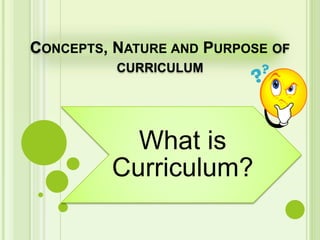
Concepts, nature and purpose of curriculum
- 1. CONCEPTS, NATURE AND PURPOSE OF CURRICULUM What is Curriculum?
- 3. 1957 RALPH TYLER [THE CURRICULUM IS] ALL THE LEARNING EXPERIENCES PLANNED AND DIRECTED BY THE SCHOOL TO ATTAIN ITS EDUCATIONAL GOALS
- 4. CURRICULUM FROM DIFFERENT POINT OF VIEW 1. Traditional Points of View of Curriculum Robert M. Hutchins Views ( Emphasize- gRammar, Reading, Rhetoric and Logic and mathematics for basic Education.) Arthur Bestor believes that curriculum should focus on the fundamental intellectual disciplines of grammar, literature and writing. Joseph Schwab views that discipline is the sole source of curriculum . Most of the traditional ideas view curriculum as written documents or a plan of action in accomplishing goals.
- 5. 2. PROGRESSIVE POINT OF VIEW OF CURRICULUM JOHN DEWEY’s believed that reflective thinking is a means that unifies curricular elements. CASWELL and CAMPBELL viewed curriculum as “ all experienced children have under the guidance teachers.” MARSH and WILLIS view curriculum as all the experiences in the classroom which are planned and enacted by the teacher, and also learned by the students.
- 6. POINTS OF VIEW ON CURRICULUM DEVELOPMENT
- 7. HILDA TABA MODEL: THE GRASSROOTS APPROACH 7 Major Steps 1. Diagnosis of Learners needs and expectations of the larger society. 2. Formulation of learning objectives 3. Selection of learning content 4. Organization of learning content 5. Selection of learning experiences 6. Organization of learning activities 7. Determination of what to evaluate and the means of doing it
- 8. TYPES OF CURRICULUM OPERATING IN SCHOOLS 1. Recommended Curriculum 2. Written Curriculum 3. Taught Curriculum 4. Supported Curriculum 5. Assessed Curriculum 6. Learned Curriculum 7. Hidden Curriculum
- 9. THE MOST COMMONLY ACCEPTED FOUNDATIONS OF CURRICULUM Philosophical Historical Psychological Social
- 11. CURRICULUM THEORISTS Franklin Bobbit ( 1876- 1956 ) Werret Charters ( 1875- 1952 )
- 12. William Kilpatrick (1871- 1965 ) Harold Rugg (1886- 1960)
- 13. Hollis Caswell ( 1901- 1989) Ralph Tyler (1902- 1994)
- 14. PSYCHOLOGICAL FOUNDATION OF EDUCATION Behaviorist Psychology Cognitive Psychology Humanistic Psychology
- 15. ACTIVITY 1: CURRICULUM DEFINED ASK EACH ONE A QUESTION : WHAT IS A CURRICULUM TO YOU? Persons Interviewed Answer to Question: What is Curriculum to you? Elementary grades Teacher School Principal Student Teacher Non- Education College student
- 16. ACTIVITY 2: IDENTIFYING THE CURRICULA OPERATING IN THE SCHOOLS ( FOR GRP. OF 5, VISIT A SCHOOL OF YOUR CHOICE OBSERVE AND INTERVIEW, THE APPROPRIATE PERSON, LIKE THE CLASSROOM TEACHER, STUDENTS OR PRINCIPALS IDENTIFY THE EXISTENCE OF DIFF. CURRICULA. WRITE SPECIFIC SAMPLES. Types of Curricula Operating in School Examples from observations from interview Recommended Curriculum Written Curriculum Taught Curriculum Supported Curriculum Assessed Curriculum Learned Curriculum Hidden Curriculum
- 17. ACTIVITY 3: CURRICULUM FROM TWO POINTS OF VIEW: TRADITIONAL OR PROGRESSIVE Points of view of curriculum Illustrative examples of Practices Traditional Curricular Practices Progressive Curricular Practices
- 18. The purpose of the curriculum is to enable each child or young person to be a successful learner, a confident individual, a responsible citizen and an effective contributor.
